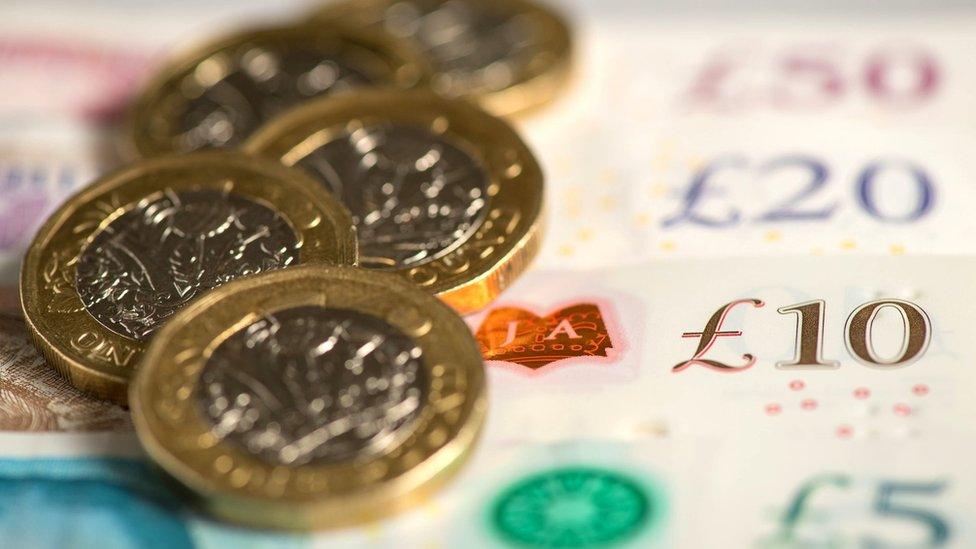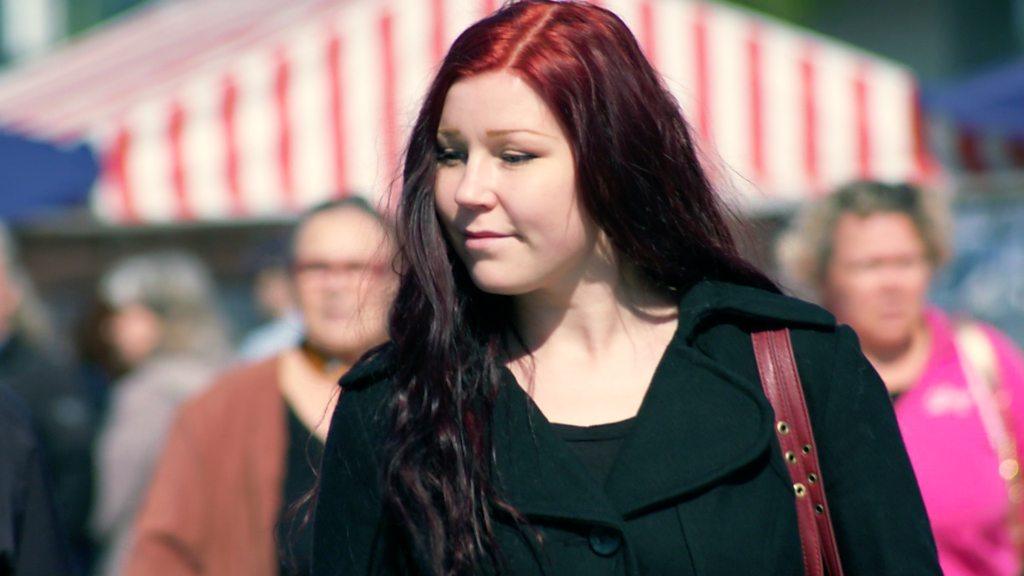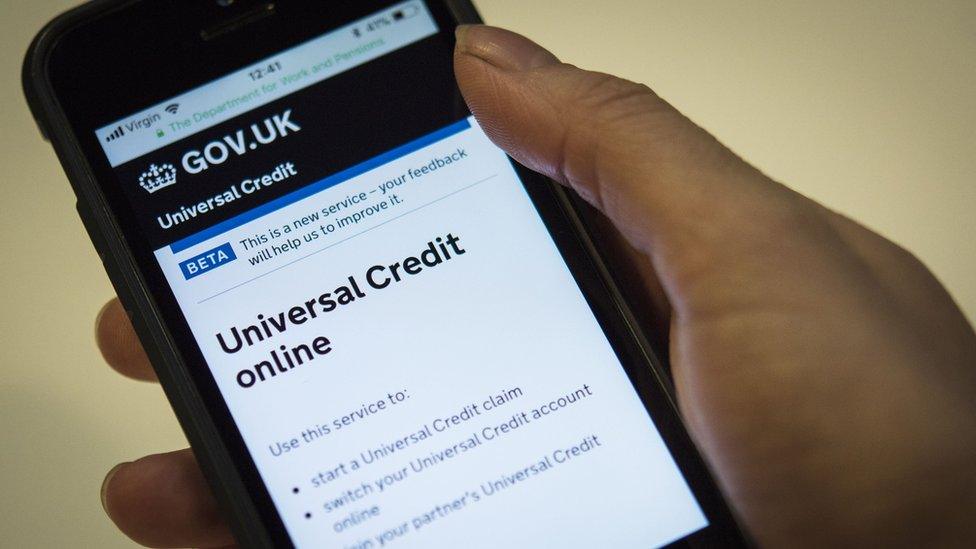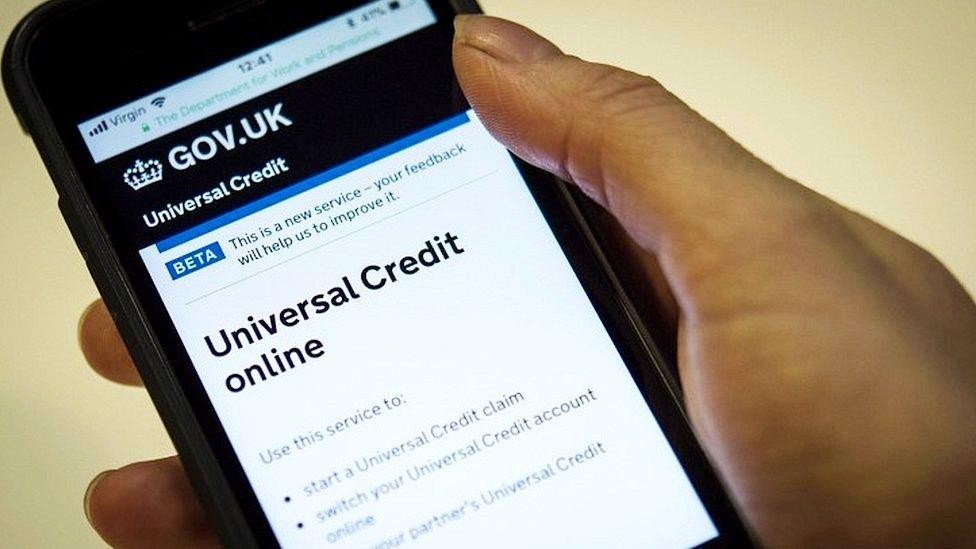Basic income of £48 a week in UK urged
- Published
- comments

Every adult in the UK should receive a weekly basic income of £48, according to the recommendations in a new report.
The move could be paid for by scrapping more than 1,000 tax reliefs, a report by Professor Guy Standing, a professor at SOAS University suggests., external
The Labour Party - which has previously floated the idea of a basic income - said it would study the report ahead of drawing up its next manifesto.
A universal basic income is already being trialled in other countries.
The report, entitled Basic Income as Common Dividends: Piloting a Transformative Policy, was written by Professor Standing, an authority on the concept of the basic income.
He was asked to write it by the Progressive Economy Forum, a left-leaning group of economists.
Advocates of a basic income say it reduces poverty and inequality by providing a guaranteed income.
But Conservative deputy chairman Helen Whately said it would be "a kick in the teeth to hardworking taxpayers".
"It would mean benefit payments for everyone, from Premier League footballers to investment bankers and even prisoners, costing billions, while hammering ordinary workers in the pocket by scrapping the tax-free income allowance."
The Treasury also criticised the report, saying it was "committed to supporting working people keep more of what they earn, while providing a strong and sustainable safety net for those who need it".
"Our policies are highly redistributive - this year the lowest income households will receive over £4 in public spending for every £1 they pay in tax, while the highest income households will contribute over £5 in tax for every £1 they receive in public spending," it added.
What is a basic income?
Universal basic income, or UBI, means that everyone gets a set monthly income, regardless of means.
The author of this latest report, Professor Guy Standing, told the BBC: "A basic income would be paid in cash, a moderate amount, a basic amount unconditionally to each individual man and woman equally, a smaller amount for a child and the good thing is it would be unconditional and it wouldn't be means tested and it would be a right, an economic right."
How much would it be?
Professor Standing said the amount would change over time as the funding for a basic income is built up.
However, initially he said the weekly sum would be £48, which he said would be a "significant amount for many people".
"Now £48 is not a lot for most people but for a lot of people out there they have £20 left at the end of the week after they've paid their rent and their food, so this is a significant amount for many people."
A lower sum would be paid to children, under these proposals.
How would it be paid for?
A rough calculation shows that if about 60 million people were paid £48 a week, that would come to about £150bn a year.
Professor Standing said there are 1,156 tax reliefs in the UK at the moment and if they were scrapped that would pay for a basic income.
"What that means [is] it's income foregone by the Treasury. Most of these tax reliefs didn't have any economic rationale and they're giveaways that are increasing inequality.
"If we phased out those tax reliefs the total revenue foregone by the Treasury from tax reliefs is £420bn per year and that's their own estimates, not mine," he added.
Has it been done elsewhere?
Some countries have tested paying a basic income to citizens.
In western Kenya, the government is paying every adult in one village $22 a month for 12 years to see if a regular payment can help lift them out of poverty.
The Netherlands and Italy have also launched trials, while Scotland is considering piloting basic income schemes in four cities, including Glasgow and Edinburgh.
Shadow Chancellor John McDonnell recently said that Labour would include a plan for universal basic income in its next general election manifesto.
However, a two-year trial in Finland, where a sample of 2,000 unemployed adults were given €560 a month, was not extended.
And in Canada, Ontario's newly elected centre-right government said it was scrapping a three-year basic income pilot project that hoped to discover whether it was better than existing welfare schemes.
This is not the first time this has been suggested in the UK is it?
No, there have been a couple of similar studies this year alone.
In March the New Economics Foundation think tank published a report, external in which it proposed replacing the personal tax allowance with a Weekly National Allowance of £48. However, it did not call it a basic income.
A week later the leftwing think tank Compass, suggested a universal basic income of £60 for each adult, £175 for those over 65 and £40 for children under the age of 18.
What are the pros?
Shadow Chancellor John McDonnell, who is attending the launch of the independent study on Tuesday, welcomed the report.
He said: "This report is an important contribution to the debate around inequality, austerity, poverty and how we establish a fair and just economic system.
"There have been pilots of 'basic income' elsewhere and Guy Standing has looked at them and come forward with proposals.
"Whatever mechanism we use, whether 'basic income' or another, we have to lead in developing a radical mechanism aimed at eradicating poverty, but also means testing.
"We will be studying the contents and recommendations of this report carefully as we put together our reform policies for the next Labour government."
What are the cons?
Opponents of a basic income are worried about how it would be paid for and what cuts would have to be made elsewhere.
And the government has previously said a universal basic income would not work for those who need more support, such as disabled people and those with caring responsibilities.
- Published8 February 2019

- Published3 February 2019

- Published25 September 2018

- Published3 August 2018

- Published16 February 2018

- Published16 October 2018
